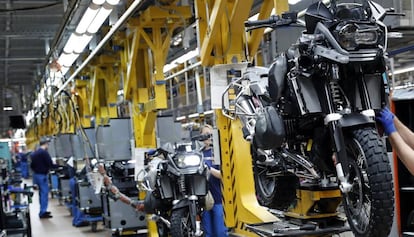Spanish industry feels the strain of global economic slowdown
Issues such as the ongoing China-US trade war are making it unlikely that the sector will reach its goal of contributing 20% of GDP

The goal of having industry represent 20% of Spain’s gross domestic product (GDP) seems increasingly like a pipe dream. Instead of gaining weight in the national economy, industry is retreating.
The latest indicators point to a slowdown in manufacturing, increasing the risk that industry’s contribution to GDP could fall below last year’s figure of 14%. The only time when this number was 20% was in the 1990s.
Spain’s industrial sector is more exposed to international events than other areas of the economy, and it has been feeling the effects of the ongoing China-US trade war, as well as Brexit, as the United Kingdom’s withdrawal from the European Union is commonly known, and the sluggishness of the German economy. Still, Spain has been more resilient to the global slowdown because its industrial sector is smaller than those of other countries.
The only sectors doing well are pulp and paper and pharmaceuticals
The consultancy company Equipo Económico warns that “there has been a contraction in the export of goods, and even more intensely in imports, as a result of the increasingly complex international scenario.”
Figures show that industrial activity only grew 0.1% in the second quarter of this year compared with 2.3% growth for the whole of the economy, according to figures from the Spanish National Statistics Institute (INE). Industry contributed 2,000 more jobless claims (up to 165,600) on a year when the number of unemployed in Spain has dropped by around 260,000, according to the latest EPA workforce survey.
Industry has also struggled with several high-profile factory closures (La Naval shipyard, aluminum giant Alcoa and wind turbine maker Vestas). Meanwhile, auto production fell 5.6% in the first half of the year due to the sluggishness of both the domestic and international markets. “It is a relevant drop, but Spain is suffering from the same trend affecting Europe, and resisting better than countries such as Germany (-12%), the United Kingdom (-21%) and Italy (-18%),” says Mario Armero, vice-president of ANFAC, the Spanish automaker business association.
Auto production fell 5.6% in the first half of the year
Steel posted “a very good 2018, but 2019 is not going that well,” says Andrés Barceló, head of the sector’s association UNESID. “Last year we grew 2% and this year we are forecasting growth of 1%.”
Chemicals, which advanced 2.6% last year, will be happy to grow 1.5% by the end of 2019. That’s according to Juan Antonio Labad, the head of FEIQUE, the Spanish business association for the chemical sector, who added that industry is also hampered by governance issues. In early August the sector asked acting Industry Minister Reyes Maroto for a committee on industrial affairs to represent all government ministries and to unify regional policies.
The only sectors doing well are paper and pharmaceuticals. “Last year we grew 8.7% and we are investing heavily to access more innovative markets,” says Carlos Reinoso, head of the ASPAPEL association for manufacturers of paper and cardboard. “The pharmaceutical industry has not registered any contraction for now,” say sources at Farmaindustria, the national association covering the pharmaceuticals sector in Spain.
English version by Susana Urra.
Tu suscripción se está usando en otro dispositivo
¿Quieres añadir otro usuario a tu suscripción?
Si continúas leyendo en este dispositivo, no se podrá leer en el otro.
FlechaTu suscripción se está usando en otro dispositivo y solo puedes acceder a EL PAÍS desde un dispositivo a la vez.
Si quieres compartir tu cuenta, cambia tu suscripción a la modalidad Premium, así podrás añadir otro usuario. Cada uno accederá con su propia cuenta de email, lo que os permitirá personalizar vuestra experiencia en EL PAÍS.
¿Tienes una suscripción de empresa? Accede aquí para contratar más cuentas.
En el caso de no saber quién está usando tu cuenta, te recomendamos cambiar tu contraseña aquí.
Si decides continuar compartiendo tu cuenta, este mensaje se mostrará en tu dispositivo y en el de la otra persona que está usando tu cuenta de forma indefinida, afectando a tu experiencia de lectura. Puedes consultar aquí los términos y condiciones de la suscripción digital.









































